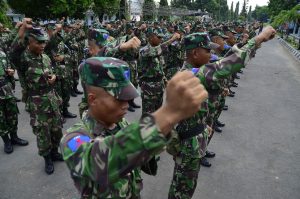As Indonesia prepares an update of its National Defense Policy, or Kebijakan Umum Pertahanan Negara, for 2025-2029, the government faces a crucial test. As the world’s third-largest democracy and a proud founder of the Bali Democracy Forum, Indonesia must prove that strengthening national security need not come at the expense of democratic values. For Indonesia’s defense policy to be credible, it must view democracy as a necessary part of national resilience rather than as an optional adjunct.
This is not simply a matter of principle. Democracies that suppress public debate, weaken civil society, and concentrate security policy in the hands of a small elite become more vulnerable to hybrid threats. These include influence operations, economic coercion, and cyberattacks, all of which exploit a lack of transparency and accountability. This article argues that strengthening democratic institutions is a necessity and an important force multiplier in building Indonesia’s resilience.
During his first national day address earlier this month, President Prabowo Subianto outlined his priorities for 2026. Food and energy resilience topped the list, while national defense ranked seventh. Within that category, the president emphasized the modernization of major weapons systems, the strengthening of the armed forces reserve, and the development of national strategic industries. He also underscored the importance of mastering strategic natural resources, such as rare earth minerals, to support Indonesia’s defense industrial base.
These are ambitious goals, and the forthcoming defense policy documents will set out how Indonesia intends to achieve them. But military modernization alone cannot secure the nation against the various challenges that it faces today.
Against a broader global context, they also arrive at a time when scholars, practitioners, and civil society, domestic and international alike, are increasingly concerned with the rise of grey-zone or hybrid warfare tactics. These are coercive actions that blend kinetic pressure with non-kinetic means such as cyberattacks, disinformation campaigns, the use of economic leverage, and the weaponization of resources like food, water, and energy.
For Indonesia, this requires defense planning and capability that goes beyond the remit of the armed forces. Based on Prabowo’s actions since taking office last year, there is a temptation for the military to encroach into civilian domains, as it is shown by the government’s recent revisions to the Indonesian military law (TNI Law). Instead of working in equal partnership with civil society, the TNI Law amendment allows serving military officers to play a much greater role in civilian government, including in operations aimed at combating cyber threats. The approach will likely create public resistance that risks weakening rather than strengthening Indonesia’s resilience to the types of attacks mentioned above.
Defense today must incorporate food security, maritime domain awareness, and critical infrastructure, as well as the cyber and information domains. This is why Indonesia’s defense must embrace a “whole-of-society” model.
First, the defense sector’s resources are finite. The armed forces cannot bear the full weight of countering hybrid threats. Think tanks, universities, technology firms, local governments, and community organizations all have expertise and networks that can bolster resilience without overstretching the military’s capacity.
Second, genuine societal engagement builds ownership. If Indonesians see themselves as active contributors in creating strategic building blocks, such as through public-private partnerships and community-based preparedness, they are more likely to support and sustain these measures. Public buy-in is essential for countering disinformation, safeguarding infrastructure, and strengthening economic security.
Civil-military cooperation also has a political dimension, and here the stakes are high. Indonesia’s information and media spheres are already contested, vulnerable to foreign disinformation campaigns and domestic political interference. Recent efforts to intimidate people criticizing the military’s involvement in public institutions and military personnel joining university events have sparked concern. There is also the unresolved matter of the military’s human rights record, particularly in Papua. Unless acknowledged openly, these issues risk undermining both public trust at home and Indonesia’s credibility abroad.
Restricting space for criticism and public debate risks eroding the legitimacy of defense policy. It would also complicate cooperation with international partners whose domestic constituents’ support is crucial for deepening the engagement to provide technology transfer, intelligence sharing, and strategic support.
One promising approach is the use of “Track 1.5” mechanisms that bring together government officials (Track 1) and non-government (Track 2) experts, such as think tank analysts, academics, and private sector practitioners. A recent research report by the Australian Strategic Policy Institute (ASPI) highlighted the value of inclusive exchanges between Indonesia and Australia aimed at addressing hybrid threats. This inclusivity prevents the monopolization of threat perceptions by the dominant elites, ensuring responses are widely supported and expertise is pooled to address the cross-domain nature of emerging threats. All of this helps ensure that national responses are more legitimate and durable, as in the case of Finland and Singapore, two nations that according to ASPI, have successfully adopted a whole-of-society approach
International collaboration can also play a role in building capacity and sharing lessons learned. Existing defense alumni networks, such as the Indonesia-Australia Defense Alumni Association and the Indo-Pacific Daniel Inouye security studies alumni network, are useful blueprints for how to provide durable points of contact for long-term cooperation.
Indonesia has an opportunity to chart a different path than the one it has followed up until now. Ensuring a space for open public debate, criticism, and civil participation is a strategic necessity. The forthcoming defense policy paper should reflect this principle. Doing so would strengthen Indonesia’s resilience, maintain cooperation with international partners, and reinforce the democratic foundations that make the country’s prosperity possible.

































